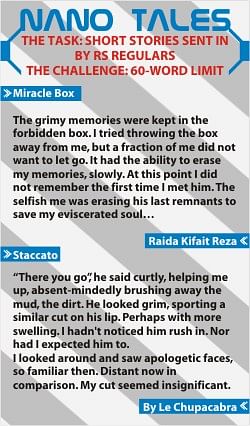
By Shuprova Tasneem
“What do you get when you multiply 387 with 25?” This question, to which you can hardly expect an answer without using a calculator, was put to 10 year old Ahnaf Tahmid.
“9675”, came the instant reply. I stared on in shock and incredulity as this child genius answered equally difficult questions off the top of his head before darting off to another room. Ahnaf has Attention Deficit Hyperactivity Disorder (ADHD) and is the son of Col Tofayel Ahmed, who established the Autistic Children's Welfare Foundation, Bangladesh (ACWFB) in Chittagong in October 2007. The ACWFB has now begun operations this April in Mirpur 12, Dhaka.
 According to the American Psychiatric Association, the term autism 'represents a wide continuum of associated cognitive and neurobehavioural disorders' with three defining features found in autistic children. These are 'deficits in socialization, deficits in verbal and non-verbal communication, and restricted & repetitive patterns of behaviour.' Autism is by no means a form of madness; a highly outmoded and prejudiced form of thought that still prevails in Bangladesh. This was made obvious to Col Tofayel, who told us how he had difficulties in finding rented premises, as owners were reluctant to be associated with 'abnormal' kids. Driving out this type of discrimination, as well as training and rehabilitating autistic children to help them lead a normal life, is the main aim of the ACWFB, and they plan to achieve this objective through educating the kids and helping them to develop their skills, educating their parents and caregivers through training and counseling and arranging regular workshops to create awareness and share knowledge about autistic children, with MGH group as their sponsor in media awareness.
According to the American Psychiatric Association, the term autism 'represents a wide continuum of associated cognitive and neurobehavioural disorders' with three defining features found in autistic children. These are 'deficits in socialization, deficits in verbal and non-verbal communication, and restricted & repetitive patterns of behaviour.' Autism is by no means a form of madness; a highly outmoded and prejudiced form of thought that still prevails in Bangladesh. This was made obvious to Col Tofayel, who told us how he had difficulties in finding rented premises, as owners were reluctant to be associated with 'abnormal' kids. Driving out this type of discrimination, as well as training and rehabilitating autistic children to help them lead a normal life, is the main aim of the ACWFB, and they plan to achieve this objective through educating the kids and helping them to develop their skills, educating their parents and caregivers through training and counseling and arranging regular workshops to create awareness and share knowledge about autistic children, with MGH group as their sponsor in media awareness.
Although ACWFB has just begun in Dhaka, they have created a comprehensive plan and taken on a number of specialists, which includes Principal Dr Marufa Begum, Vice Principal Nasima Mahfuz Shumi PhD, Occupational Therapist Nurunnahar Nupur, Clinical Psychologist Naima Islam and Physiotherapist Sajjad Kabir. As I looked around in the different colour coordinated classrooms with specially designed tables, Ms. Nupur explained how they used minimum decorations to keep from distracting the kids and used a number of teaching aids and materials for attention development, hand functions, motor development etc., such as toys which only give out either light or sound so that kids can identify and learn to used all their senses. Various other interesting methods are also used, such as letting kids with an altered sense of touch feel different sorts of seeds to get them used to the sensation, and teaching them to string together beads to help them concentrate. Col Tofayel's younger son, who also has autism, was engaged in this latter activity when I met him.
“I don't think of my son as a difficulty; God gave him to me so that I can do something for other children like him. But as a father I can say this, there will be progress, but you cannot expect a miracle.”
There is also an unfinished occupational and sensory therapy room, with exercise machines, different coloured lights and other tools for teaching the kids.
ACWFB emphasizes on the importance of qualified teachers, choosing to train and evaluate them constantly to ensure that the desired outcome is being achieved within the expected time frame. Teachers are also rotated according to subjects like in regular schools so students do not get too dependent on one person.
“It is important to use a multidisciplinary and structured approach with no room for errors. What we need to do is to understand the child's capabilities and create the right amount of challenge and help them to reach the next level without pressurizing them, and building up trust is necessary for this purpose,” says Ms. Nupur.
She also puts great emphasis on the role of parents in understanding autism, since parents are meant to be the strength of the organization. “Parents have to understand that autism is not a curse and their children can be integrated into society. They must stop hiding their child's condition and let them learn in their own way, without restrictions.”
Since they are a considerably new organization, ACWFB can only take around 20 kids on a first come basis. Their admission fee is generally Tk 10,000 and monthly fee Tk 2500, although they can consider reducing this amount based on needs, but they need people to come forward as they depend on members and donors for funding. For students they cannot admit, they offer to teach parents a 24-hour curriculum of activities for their children, assessing their progress at the end of each month.
In spite of their small size and reach, the Foundation has big dreams of creating a residence in the future for out-of-town students. Here's hoping that they can fulfill that and all their other commendable objectives, leading to a better future for autistic children in our country.

